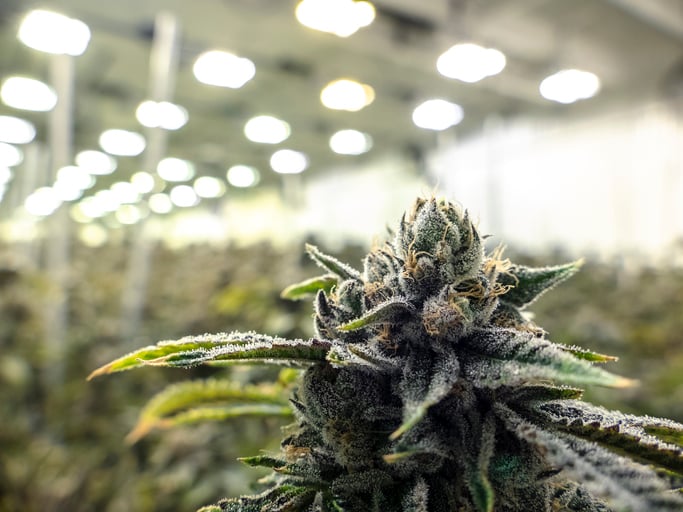It's amazing what a difference a decade makes. Just 10 years ago, no country had legalized recreational marijuana, only a relatively small number of U.S. states had given the OK to medical cannabis, and a mere 44% of Americans polled by Gallup were in favor of a nationwide legalization of weed.
Fast-forward to today, where two countries have given the green light to recreational marijuana (Canada and Uruguay); 33 U.S. states have legalized medical pot, with 10 also allowing adult-use consumption; and a whopping 66% of the American public now favors full legalization. It's this growing support and broadening number of legalizations within the U.S. and worldwide that have pushed growth estimates for the industry through the roof and sent pot stocks soaring.

Image source: Getty Images.
Say hello to the only large-cap marijuana stock
Perhaps no marijuana stock has been a bigger beneficiary of this growth than Canopy Growth (CGC +0.00%). The largest pot stock in the world by market cap, Canopy has seen its share price rise from the mid-$1 range to $43 per share over the trailing four-year period, giving it a market cap of about $15 billion. Currently, Canopy Growth is the only marijuana stock that's a legitimate large cap.
As you can imagine, there's a lot for Wall Street to like about Canopy Growth. This is a company that's managed to get more than 4.3 million square feet of its aggregate 5.6 million square feet in cultivation space licensed by Health Canada. The remainder should be licensed by the end of the year, leading to peak annual production of more than 500,000 kilos, assuming an average yield per square foot relative to the industry.
Canopy Growth is also flush with cash following a third equity investment from Corona and Modelo beer maker Constellation Brands, which closed in November 2018. This latest investment totaled $4 billion and gave Constellation a 37% equity stake in Canopy. Constellation also received warrants that it could execute in the future, which would increase its stake to 56%. Canopy Growth ended its fiscal third quarter with about $3.7 billion in cash and cash equivalents, giving it more than enough capital to make complementary acquisitions, diversify its product line, market and build its brands, and enter new markets.
This is also a company that's done an excellent job of pushing into overseas markets and securing more than 70,000 kilos in domestic supply deals.
These pot stocks are far more attractive
And yet, Canopy Growth is also priced very aggressively. Wall Street isn't expecting it to generate a recurring profit until 2021 at the earliest, and the company has been hit, like most growers, by a supply chain bottleneck in Canada. This has caused sales estimates for all growers, but most notably Canopy Growth, to plummet. With Canopy already sporting a $15 billion market cap, the truth of the matter is there are considerably more attractive pot stocks out there for investors to consider buying.

Image source: Getty Images.
CannTrust Holdings
Although it had what was perceived to be a subpar fourth-quarter report, per Wall Street, CannTrust Holdings (CTST +0.00%) looks like a much smarter way to play the cannabis grow industry than Canopy Growth, at this point.
Unlike most pot growers, CannTrust is leaning on hydroponics at its flagship Niagara facility and its much smaller Vaughan campus. Hydroponics involves growing plants in a nutrient-rich water solvent as opposed to traditional soil. Assuming a grower has cheap access to water and electricity, which is precisely the case with the Niagara facility, hydroponic growing techniques can offer superior per-gram production costs compared with traditional soil-based operations. Not to mention, CannTrust's Niagara facility incorporates a lot of technology, including the perpetual harvest system that has moving containerized benches. In short, this should lead to steadier (i.e., less lumpy) harvests and very low-cost production.
In January, following a roughly six-month-long cloud of uncertainty overhanging CannTrust, the company and the town of Pelham agreed on a 390,000-square-foot, phase 3 expansion of the Niagara facility. Having already completed 450,000 square feet, this additional capacity should help CannTrust push to about 100,000 kilos of yearly production.
Furthermore, in the company's fourth-quarter press release, it announced its intention to acquire 200 acres of land and put this land to work by growing 100,000 kilos to 200,000 kilos of cannabis outdoors. This essentially vaults CannTrust into the top five, if not top three, growers by peak production. Sporting a market cap of less than $800 million, CannTrust may be too cheap to pass up.

Image source: Getty Images.
Trulieve Cannabis
Generally speaking, the vertically integrated, multistate cannabis dispensary space is worth avoiding. This is an acquisition-heavy niche at the moment, with most dispensary operators appearing to overpay for rivals in order to push their brand into new states. The costs associated with constructing cultivation farms, processing facilities, and retail stores are also high, leading to operating losses for most pot stocks in this space. But Trulieve Cannabis (TCNNF +8.03%) is an exception.
Whereas many of Trulieve's competitors have a growing presence in 10 or more states, this is a company that's been primarily focused on Florida's medical marijuana market. Trulieve currently operates more than two dozen retail locations in Florida, which is expected to become a multibillion-dollar market for medical weed sales. Also, the average age of Floridians is higher than the national average, making it more likely that medical cannabis products could help with the ailments they're dealing with.
Trulieve Cannabis did make two acquisitions late in 2018 that'll see it move into Massachusetts and California -- the latter of which is expected to be the largest legal market in the United States. However, the company's central focus on the Florida market has been the key to keeping recurring operating expenses down. In the third quarter, Trulieve recognized $28.3 million in sales, but operating expenses tallied just $8 million, meaning it's one of a rare number of pot stocks that's profitable on an operating basis.
While it's possible that operating expenses could rise substantially as Truelieve pushes into California and Massachusetts, its established footprint in Florida makes it a much more attractive company, fundamentally, than Canopy Growth.

Image source: Getty Images.
Flowr Corporation
Lastly, I'd encourage investors to think small in the growing space and consider a specialized company like Flowr Corp. (FLWPF +0.00%).
A quick glance at Flowr Corp.'s production right now probably wouldn't lend a ton of encouragement. The company is only producing at an annual run rate of about 5,000 kilos, but it's hard at work building out its Kelowna campus in British Columbia. When complete, Flowr's flagship campus will be producing about 60,000 kilos a year beginning in 2021.
So, what makes a mid-tier producer so special? Namely that Flowr is focusing on a niche of the growing space that few other companies are: ultra-premium cannabis. Most of the dried flower on dispensary shelves is currently of the discount or average variety, with little in the way of premium cannabis for sale. The thing is, premium flower has a much higher price point than average flower (as expected), but is far less prone to pricing pressure. This means premium weed can safely produce higher margins.
The consumer Flowr is targeting is also different from the typical marijuana user. Flowr's customer isn't likely to be entrenched in traditional cannabis culture. Rather, they're a more affluent user looking for something unique to enhance their cannabis-use experience. This means the company's target customer is unlikely to be phased by minor fluctuations in the Canadian economy.
The company's Kelowna campus should also yield about 300 grams to 450 grams per square foot. That's roughly three to 4.5 times better than the industry average.
Although it's not profitable at the moment, Flowr's unique focus should lend to exceptionally strong operating margins and profits within the next two years. As such, it's worth a serious look by investors.









